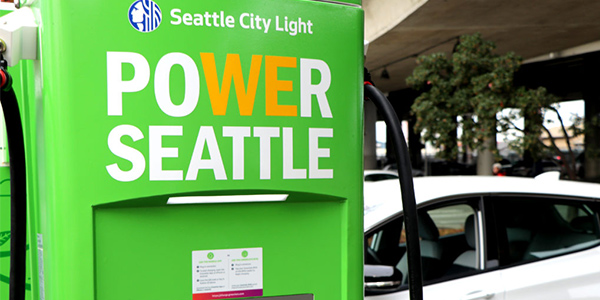As electric vehicles become more common in Washington, the state will need more charging infrastructure to sustain them. A bill is working its way through the state legislature to map out what and where those needs will be.
“The market demand is growing each year, and we ought to be ready,” Rep. Alex Ramel (D), the bill’s sponsor, said.
HB 1287 calls for the Washington Department of Transportation to set up a system by 2023 to predict the growth of EVs in the state, where that growth might occur and the number and location of charging stations. The legislation also calls for the state’s electric utilities to use those state predictions to map out where charging stations should be installed in their own service territories.
Ramel said the mapping efforts should include airports and ferry sites.
That bill would also order the Washington State Building Code Council to improve on the standards that it set for charging stations in 2019.
The House passed the legislation 65-31 on March 3. Eight Republicans crossed the aisle to join the Democratic majority. The bill is now in the Senate Environment, Energy and Technology Committee.
Ramel said the bill originated from utilities’ representatives approaching him expressing uncertainty about future numbers and the best locations for charging stations. Roughly 64,000 out of Washington’s 7.5 million vehicles are electric, according to state estimates.
In two House committee hearings in February, a handful of energy-oriented organizations and state agencies testified. Testimony ranged from support to a wait-and-see neutrality. No one testified against the bill in either hearing. A few asked that hydrogen fuel cell stations be added to the mapping project.
At a Feb. 16 House Transportation Committee hearing, Carolyn Logue, representing the Washington Food Industry Association, called for the mapping efforts to look at gas stations as charging points. She noted that the growing use of EVs will translate into a shrinking use of gas stations and convenience stores. Consequently, gas station and convenience store interests want to participate in the studies, she said.
Republican objections to the bill surfaced when it was voted out of the Transportation Committee on Feb. 18 along party lines.
Rep. Jim Walsh (R) said, “If we are planning for infrastructure, we have to ask questions about the electrical grids.” Rep. Robert Sutherland (R) added, “Where is all the electricity coming from to charge, to power all these vehicles. … If we do it wrong, it’s going to take a whole lot of money to fix it.”




